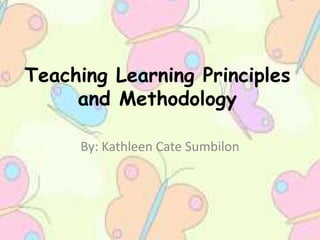
Learning principles and methodology
- 1. Teaching Learning Principles and Methodology By: Kathleen Cate Sumbilon
- 2. The Learning Process Learning is an integrated, ongoing process occuring within the individual, enabling him to meet his specific aims, fulfill his needs and interests, and cope within the living process.
- 3. The Learning Process 5 Distinct Phases of Learning: 1. Unfreezing- the individual becomes ready to consider changes in knowledge, skills, attitudes, and behavior. 2. Problem diagnosis- the forces supporting the need for change and the forces working against the changed needs are identified and presented.
- 4. The Learning Process 5 Distinct Phases of Learning: 3. Goal Setting- the desired changes in knowledge, skills, attitudes, and behavior are stated specifically. 4. New behavior- the individual learns and practices those newer knowledge, skills, attitudes and behavior which are desired. 5. Refreezing- the newer learnings have been found to be beneficial and are assimilated into the individuals ongoing framework of knowledge, skills, attitudes and behavior.
- 5. Characteristics of Learning 1. Learning is Developmental- as the individual grows and develops, he acquires various types of knowledge, habits, and skills which may be essential to his successful adjustment during different stages of development. 2. Learning is Interactive- it is only when the learner reacts to the environmental stimuli that he is going to learn.
- 6. Characteristics of Learning 3. Learning is Basic- learning is basically an association between them, and this association can be strengthened by constant exercise.
- 7. The Teacher as the Facilitator 1. Provides the conditions for effective learning. 2. Seeks to meet the needs and interests of the learner. 3. Helps to create conditions for openness, respect, trust, acceptance, confrontation and self evaluation. 4. Places emphasis on the uniqueness and rights of the individual. 5. Seeks feedback which will improve his effectiveness as a facilitator of the learning process.
- 8. Principles of Learning The learner must: ○ Clearly perceive the goal. ○ Be psychologically and physiologically ready. ○ Be motivated to learn. ○ Be active not passive for maximum learning. ○ Repeat or practice what he has learned in order to remember.
- 9. Principles of Learning o Put together the parts of a task and perceive it as a meaningful whole. o See the significance, meanings ,implications, and applications that will make a given experience understandable. o Be prepared to respond. o The process of problem solving and learning are highly unique and specific.
- 10. Principles Of Learning • Be motivated to learn. Two types of motivation: Extrinsic and Intrinsic Extrinsic Motivations – comes in the form of reward and punishment such as grades (high and low), honors monetary rewards, medals, disqualification from joining occuricular activity and the like.
- 11. Principles of Learning • Be motivated to learn Intrinsic Motivation – means creating a desire to learn a subject because it is worth knowing.
- 12. Conditions Which Facilitate Learning Pick and explain game :D
- 13. Methodology Method in the Educative Process In the educative process the three most important factors are the child, the teacher and the subject matter.
- 14. Importance of Method o The teacher must follow a method of he expects to achieve the desired results. o Method is probably more important in the elementary grades than in high school or in college where the students are more mature and can study by themselves. o The learning by the young children must be guided, and method provides this guidance.
- 15. Meaning of Method The word method comes from the Greek methodos , which in turn comes from two Greek words: meta (after) and hodos (way). Dictionary meaning of Method- a mode of procedure, especially an orderly or systematic mode; a way of doing something especially in accordance with a definite plan.
- 16. Meaning of Method Method in teaching means- a series of related and progressive acts performed by the teacher and the pupils to accomplish the general and specific aims of the lesson.
- 17. Relation between Method of Teaching and Method of Learnig Teaching Learning
- 18. Functions of Method o Forms the bridge between the child and the subject matter; o Makes learning easier; o Links the child and the society; o The child’s personality unfolds and he learns to adjust to his surroundings; o Child learns restraint and self control; o A child learns to cooperate with others
- 19. Factors that Determine the Method o The educational objective and aim of the lesson; o Nature of the subject matter or the lesson; o The nature of the learners; o School equipment and facilities; and o The teacher.
- 20. Distinctions Among Method, Device, and Technique A device is a “little method”. It is a teaching aid or tool to facilitate instruction. It is used to make the teaching clearer, more meaningful and more interesting. Technique- refers to the art or skill of performance.( action and gestures, changing facial expressions,…) “Two teachers may use the same method and devices in teaching the same subject matter, but they may be differ in technique.”
- 21. Characteristics of a Good Method “There is no single best method, but there are many good methods.” A teaching method is good if: o It makes use of the principles of learning and permits the operation of these principles such as readiness, exercise, and effect as provided for.
- 22. Characteristics of a Good Method o It utilizes the principle of “learning by doing”; o It provides for individual differences; o It stimulates thinking and reasoning; and o It provides for growth and development.
- 23. Influence of Differing Schools of Thought on Method Traditionally Conservative Schools- time-tested methods Modern Progressive Schools- Improved instructional practices and Discussion procedures Compare them with their Objectives, Role of the teacher, Curriculum, and Discipline
